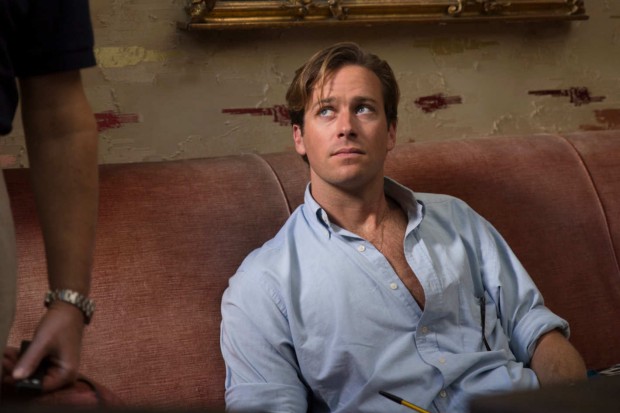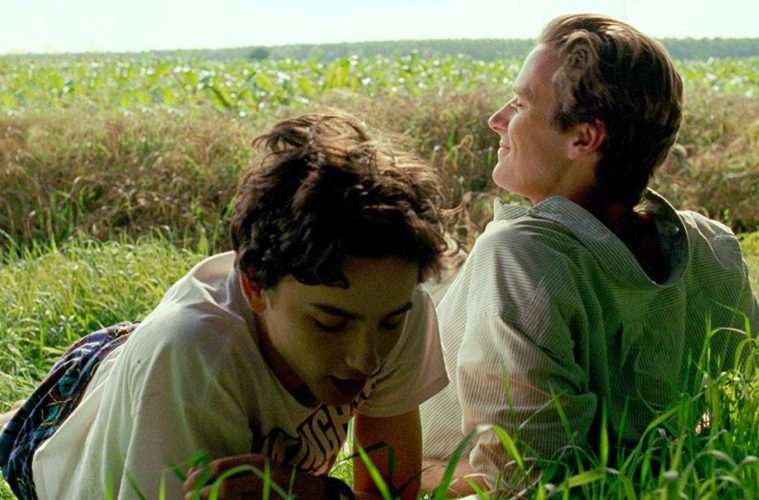
Timothée Chalamet showed up for a long day of New York Film Festival interviews after his Call Me By Your Name castmate Armie Hammer. When “Timmy” (as the cast and crew affectionately call him) walked in, Hammer blasted Kanye’s Can’t Tell Me Nothing and the two danced until the film’s publicist pulled them into our interview.
Call Me By Your Name is dominating entertainment headlines of late: last weekend the film earned the highest per-theater-average of 2017. Following that, Hammer deleted his Twitter account after calling Buzzfeed’s hit piece on him “bitter AF,” Chalamet won Breakthrough Actor at both National Board of Review and the Gotham Awards, where the film also won Best Feature. For reference, the last three films to win Best Feature at Gotham went on to win Best Picture at the Academy Awards.
Hammer led the conversation, with Chalamet often deferring to the seasoned actor, noting it was his first press junket. The duo talked about director Luca Guadagnino’s intimate set, the personal transformations that took place during the shoot, and the idea of returning for a second chapter of the Elio Perlman Chronicles.
Luca said when he was casting you guys he didn’t do screen testing or anything. He said a lot of it was based on who you are as people. So, what in the movie is clearly you?
Armie Hammer: I mean, I’ve been told that Oliver really looks a lot like me. All jokes aside, you know, every character that you do as an actor–I don’t want to wax philosophical about acting and sound like that guy–but everything you do has a little bit of you in it by default. It’s you doing it. The goal is to try to shave that down to as little as possible. The better you get at it probably the less of you there can be in it. At this point where I’m at in my career right now, and how much I feel I still have to learn, there’s probably quite a bit of me in there. Whether some of the body language stuff, some of the reactions. But the goal, I guess, would be to completely learn how to shed that.
Timothée Chalamet: I really couldn’t say it better myself. I think the parts of yourself that are appropriate for the character you let bleed in and the parts that are inappropriate you shave off, as Armie put it. I guess for more period-oriented pieces there’s a certain mannerism-learning process or dialect-learning process, but I think it changes from role to role, project to project.
I heard it was a small production, like one camera.
Hammer: We only used one lens the entire time.

So it was an intimate experience for you. How is it to take that to people across the world, to share that experience with people? Is it tough to express it and are there things you want to keep for yourself?
Hammer: There are things that I’ve learned and that I went through in the sense of personal transformations. There’s stuff that I was lucky enough to go through in this film that I don’t feel the need to share with everybody. But as far as people watching it and watching what happens, I think that so many people are having their own reaction, you know, which is a wonderful part of art and what art can do–changing perspectives, changing people’s minds. So personally I’ve got stuff that I learned, just like anybody who watches might get something personally from it. Like the movie on a whole, there’s nothing about the movie that I feel hesitant or nervous about people watching. I wish everyone could see it, especially with the work that Timmy does and the speech that Michael Stuhlbarg gives.
Chalamet: What’s more destabilizing for me and where I find myself really full of gratitude is that I have someone like Armie to lean on in this experience of showing something you worked on a year and a half ago. To talk about it in abundance now, I haven’t done any sort of press tour or press junket like this before, so that’s been the real learning experience. But I’m really between two MVPS, between Luca and Armie because they are really good at this.

What was it like working with Michael Stuhlbarg?
Hammer: A gift.
Chalamet: Michael, yeah, it was an absolute gift. You know I went to LaGuardia High School. It’s a theater high school, and I grew up seeing a lot of plays in New York and had seen Michael Stuhlbarg in The Pillowman about eight or nine years ago. I was floored by his performance, so the opportunity to work and the opportunity to learn from him was an absolute gift.
Hammer: You know, I didn’t get to work with him as much as Tim did, which I was really jealous about. But when I did get to work with him, I was just amazed. It was such a delicate and beautiful sense of complete control over his instrument. You didn’t watch a guy struggling to do his job, you watched the man just so perfectly embody this thing that it looked effortless, which you know it’s not, and to just see that and to work with someone who is that talented is amazing.
Now what about working with Luca Guadagnino?
Chalamet: An absolutely dream. You know, I went to Columbia University uptown and they offered Luca professorship which is something I always like to point to and talk to friends about him. Beyond being an incredible filmmaker and auteur, there is a depth of knowledge as cinephile the likes I haven’t talked to before. That is was a tremendous learning experience to be around in the process of making the film and just learning about films in general. I was out there about a month early and we had a couple of screenings in his gorgeous screening room in Crema. We watched Alien and we watched Body Double, we watched Babette’s Feast. My parents give me a hard time about leaving school, so I can point to and say that I was with someone who could’ve been a professor at Columbia. [Laughs.]
Luca said he might do another film or series of films, sort of what Truffaut did with Antoine Doinel. Are you game to keep the story going?
Hammer: Page-wise, there’s a small section of the book that didn’t make it into this movie, but it’s the span of twenty, thirty years.
Chalamet: I mean, any opportunity to work with Luca again would be incredible. Certainly these characters, Armie and Michael Stuhlbarg, they all have a special place in my heart.
Hammer: It depends on how much they’re paying. [Both laugh.]

Armie, how do you compare playing Clyde Tolson in J. Edgar and Oliver in this film?
Hammer: They’re in different places and different people, but at the same time they’re both just people, they’re just humans. It doesn’t feel any different to play a character. I mean… it feels different to play every character regardless of where they come from, their background, their orientation, their identification, their whatever. It’s all different and that’s all part of the fun. You get to now put yourself in the perspective of someone totally different from yourself, which is an incredibly enriching and enlightening thing to do. If you think everybody should think like you and everybody does think like you, then anybody who’s different is wrong. But if you’re putting yourself in different perspectives then you realize people are just people. I think that’s a wonderful side of acting. You get a chance to really see from other people’s perspectives.
It doesn’t seem like other directors love their actors the way Luca does. He was telling me he cast you because of your performance in The Lone Ranger. How does it feel to work with a guy who loves you so much a person?
Hammer: It was great, it’s great. I think he loved us as much as we loved him and it was a wonderful part of this experience: the fact that we all got to have, in one way or another, a summer romance with each other.
Chalamet: It’s a tremendous gift. It imbues you with a sense of freedom that isn’t there on every project or even in a school setting sometimes. We were in a Q&A a couple of weeks ago and Luca quoted Quentin Tarantino and said that you must desire your actors. That sense of desire was very palpable on set in a way that only help to trust, because it felt like Luca had real faith and trust in Armie, Michael and I as actors.
Call Me by Your Name is now in limited release and expands in the coming weeks.

